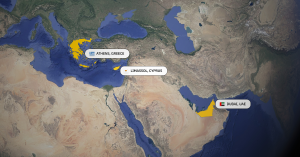How did one of the hottest innovation and technology hubs in the world come to be? Founded by European Jews in an ancient province and proclaimed a state in 1948, Israel is a very young country. Yet in a short time span, they have managed to build a strong foundation for a thriving innovation environment. The Israeli startup ecosystem has achieved an outstanding performance, including the highest concentration of startups per capita, reaching more than 6000 startups and twice as many unicorns (98) as the UK (47). These impressive figures have placed Israel at the top of the startup ecosystem in the Middle East and in the top 3 worldwide.
To understand what drove Israel’s success and draw parallels with Central and Eastern Europe, The Recursive taps into the know-how of local ecosystem players – Allon Mason, serial entrepreneur, Founder and CEO of UserWay.org, a pioneer of AI-powered digital accessibility technologies, and Ido Garbi, Head of NLP (Natural Language Processing) Research at WINN.AI Labs, one of the most promising sales AI startups worldwide.
In the article, you’ll explore the answers to:
- Why is the Israeli startup ecosystem a beacon of success on the global tech scene?
- What are the success drives for Israel?
- How do Central and Eastern European markets resemble Israel, and what can the region learn from Israel’s approach to becoming a scale-up nation?
From a high-tech hub to a scale-up nation
The Israeli startup ecosystem began to take shape between the late 1980s and the early 1990s. The foundation for the high-tech industry was laid by former members of national military intelligence units, starting with the 8200 Intelligence Corps unit.
Allon Mason explains the process in detail: “8200 scouts for talented potential developers among 10th or 11th graders who are at the top of their class in STEM disciplines, and they’ll earmark them for special units in the Israeli Defense Forces (IDF). And those units will give birth to many leading innovations. For example, one of Israel’s most famous unicorns called PillCam – a tiny pill-sized video camera that patients swallow to track and monitor their digestive system (i.e,. capsule-based endoscopy), was repurposed military technology used in high accuracy video-guided missiles systems, tech born in the IDF”.
One milestone for Israel came with AOL’s acquisition of the ICQ messaging system developed by an Israeli company called Mirabilis. Fast forwarding to 2013, satellite navigation software company Waze was acquired by Google for more than $1 billion, making each of its 100 employees at the time $1.2M richer, and creating a new pool of entrepreneurs and investors.
Throughout the years, Israel has achieved breakthroughs in areas such as internet security, big data, healthcare, agriculture, biotechnology, and water tech. Two of the top industries in Israel today are AI and cybersecurity. Israel ranks third in the world by the number of AI and ML startups, whereas one in three cybersecurity unicorns in the world is an Israeli company.
Tel Aviv is the epicentre of the Israeli startup ecosystem, raising 63% of total startup funding in 2021. Total VC funding in the city hit $30 billion between 2017-2021, compared to the global average of $4.5 billion. Startups also exit faster in Tel Aviv – after 7 years vs. the global average of 9 years on average. Last year alone, Tel Aviv gained 30 new unicorns and welcomed 20 scale-ups on the stock market.
Today, Israel is a scale-up nation. With close to 100 unicorns and 300 research centres of companies such as Intel, eBay, and Amazon, there are far more people working for scale-ups and established companies. The scale-up phase came with a change in mentality, as Allon Mason shares: “Instead of giving in to the temptation of selling a well-performing startup for $100M or $200M, founders have recently become more ambitious, realizing they can achieve more if they scale up intelligently. The scale-up strategy often includes raising growth-level financing rounds and acquiring complementary companies to continue their expansion.” He gives the example of Fiverr (NYSE: FVRR, ~$1.4B market cap), the world’s number one freelance marketplace, which operates with an entrepreneurial mentality, with each business unit functioning like an individual startup.
Even so, it is a scale-up nation that continues to produce startups. Ido Garbi tells us why the two dimensions don’t only compete in terms of talent, but also help fuel each other: “The advantage of having scaleups in an ecosystem is that a lot of experience in the later stages of an enterprise is being accumulated and trickles down into the ecosystem. There is a significant difference between a scaleup and a startup – a startup is looking for a product-market fit, while a scaleup is a creature that reached a product-market fit and now grows. Growing an enterprise requires a different set of skills and know-how, so not only that startup and scaleups don’t really compete over talent, they actually compliment each other – when you can find the knowledge of how to scale up things in an ecosystem, then existing startups have a higher chance to also get scaled up, and when you find more startups in an ecosystem more scaleups tend to emerge”.
Drivers of success: What CEE can learn from the Israeli startup ecosystem
According to experts, Central and Eastern European countries are not so different from Israel. Some of the startup ecosystems in these countries may be on their way to reaching the same level of success as Israel.
“In my last visit to Bulgaria, I saw the Israel of a few years ago. It was delightful to see it because it shows that the Israeli model can be replicated elsewhere. This is not only just my impression, it is a common theme among Israelis that worked with Bulgarians. It’s great to work with Bulgarians in tech because they, like Israelis, have a can-do attitude,” Ido Garbi thinks.
Next, we dive into the key drivers of growth for the Israeli startup ecosystem and draw parallels with Central and Eastern Europe, pointing out what would help the region accelerate the path to scaling up.
Strong ties to the US
Today, the US is Israel’s number one target market and investment partner when it comes to innovation. Ties to the US started long before Israel needed to sell its high-tech products, when they needed a supplier for military equipment. Since then, the country continued to forge relationships with the US as a way to reach the world’s most innovative market, in the absence of a sizable local market or potential for collaboration with neighboring countries.
“The first thing that is important to learn from Israel is to be connected to the United States. In Eastern Europe, it’s very easy to be connected to the rest of Europe, but the European technological markets are relatively slow. The American one on the other hand is extraordinarily fast and it sets the trends. Stay connected to the United States and innovation will follow”, Ido Garbi shares.
Allon Mason shares what happened when he launched his first startup in the Israeli market instead of Europe or the US: “We made what I refer to as a fateful mistake, by saying we’re going to do a pilot in Israel. Our goal was to raise $1-2 million within a year and then take that POC and launch in the US market. The POC ended up becoming the business itself – we were never able to outgrow the Israeli market. If we had launched in the US market directly, we would have been in a completely different place. Focusing first on your local market is rarely going to be a winning strategy. Go big from day one.”
Why is the US a more attractive market? Aside from the obvious size advantage, it’s much more homogenous. “For every hour of effort, you’ll achieve a 100x multiple in the US market vs. a much smaller local market. It’s a no brainer,” says Allon Mason.
For countries small and diverse as Israel, including some in Central and Eastern Europe, the US is simply easier and more effective to target.
“Success in Israel does not guarantee success in the US market. But succeeding in the US is tantamount to succeeding globally,” Mason adds.
Instead, what Mason sees happening in the CEE region today is many startups focusing on either local markets or neighboring countries rather than the US, which closely reminds him of the lessons he learned from his previous startup.
Continued government support for innovation
As early as 1993, the Israeli government initiated the Yozma Programme, offering an attractive incentive to foreign VCs to invest in Israel: a matching scheme that promised to double any investments with public funds, as well as tax incentives. At the time, this approach stood out among startup ecosystems around the world. Eastern European governments, for instance, were much slower in incentivizing venture capital, although more schemes are being launched or expected in recent years.
Other formal programs in place for Israeli startups include more than 40 programs by the Israel Innovation Authority (IIA), also known as the Office of the Chief Scientist (OCS), with an annual budget of about $400 million. There is also an Intellectual Property Incentive that offers tax reductions for corporate, dividend, and capital gains tax rates; and Angel’s Law that provides tax benefits and deductions to single investors who finance Israeli companies during the R&D (seed) stage, and an incentive program of employment grants for R&D centers and large enterprises.
The Israeli government didn’t need convincing to invest in and support startups. The approach towards business in the government reflects the entrepreneurial spirit of the country and formalizes it with policy and support programs.
“Today, companies can raise funds directly through the OCS without any VC funding. Average investments range between $500,000 and a few million dollars, and come in the form of a loan with interest. At UserWay, we recently acquired a company that had received investment from the OCS,” Mason adds.
Strong foreign investment
The government’s bureaucratic, policy, and funding support has encouraged substantial private investment activity in Israel. In 2022, the funding activity reached €7.4 billion across 572 funding rounds, the bulk of which was taken home by Series A to Series C stage companies, according to Dealroom. Furthermore, 70% of the funds came from foreign investors: 27% from the US and 25% from Europe.
Of the total, €4.6 billion was venture capital. And even if VC funding slowed in 2022, sliding down 24% since 2021, it was still 64% higher than in 2020.
“There is a lot of venture capital available in Israel. Israel is a great combination of attitude, talent, and venture capital, in that exact order. The attitude created the talent, which then brought the venture capital. And it brought a lot of it – if I remember correctly around 4% of all worldwide venture capital is invested in Israel, even though it’s a small country,” Garbi says.
Investment in R&D
Israel also has an impressive R&D investment record. The country invests about 4.1% of its GDP in R&D, twice the OECD average and the second-highest R&D expenditure per capita worldwide.
In the last few decades, more than 300 multinational corporations established R&D centres in Israel, and account for 50% of business enterprise R&D expenditure, a trend we also notice in the CEE region. Multinationals, including Volkswagen, Anheuser-Busch, Apple, Citibank, and over 130 others, have established innovation centres in Tel Aviv. In turn, multinationals acquire local companies and foster a culture of entrepreneurship and technological leadership.
Strong connections to the diaspora
Another thing at which Israelis excels is maintaining connections to the diaspora. As in many Central and Eastern European countries, Israel has had a fair share of talented people migrating to other places.
“Israelis migrated to the US, developed their careers and after a while obtained key positions. When they did, Israel became a point of interest for American firms, because the Israeli executives knew what talent they could find in their home country, and because Israel made sure to maintain good connections with diaspora Jews. That is how Israel became a focal point for the US – through a brain drain that became a brain gain as foreign companies opened research centers in Israel and nurtured new local talent. It only takes one company to open a research centre in a country for others to follow,” Garbi shares.
Deeply-rooted entrepreneurial culture
Last but not least, Israel has a culture whose seeds of entrepreneurship are born into resilience and adaptability – two essential skills Israeli people have had to master in time, and to which Eastern Europeans are no strangers.
Allon Mason explains at length why Israel’s geopolitical context helped shape the country’s innovation-prone attitude: “Due to the fickle geopolitical ecosystem, the conflicts with its neighbours, and the lack of natural resources, Israel had little choice but to find ways to innovate, out of necessity. At its founding in 1948, Israel was mostly arid, desert land. In order to sustain itself and develop agriculture, it had to solve the water scarcity issue, which it did. Today, many desalination technologies used around the world were actually born in Israel.”
Mason adds that the unstable geopolitical climate gave rise to the necessity for military innovation and doing things with efficiency in mind. In Israel, women aged 18 to 20 and men aged 18 to 21 are required to serve in the army. That’s where, at relatively young ages, people learn to command squads and platoons, gaining leadership skills that are critical also when managing companies.
As a result of these struggles and their military contributions “people in Israel don’t just feel like passive members of the country. They feel like its shareholders,” Allon Mason says.
It’s not perhaps surprising then that in Israel people are not afraid to approach, work with, and sell to each other: “If you want to approach all kinds of experts in Israel with an idea, they will be very open. Even if what you ask for is pretty wacky, if you’re interesting enough and you ask nicely, you will likely find an open door. Imagine how hard it would be if you tried to do something significant and impactful without being able to ask experts in the field wacky questions. In Israel, you can ask anything”, Ido Garbi reflects, adding: “In Israel, we learned to sell. Pitching something to someone doesn’t mean you harm them or steal from them; you exchange value with them. This is an important distinction. If you don’t produce value, no one will buy from you no matter how hard you bargain.”
One other thing that, according to Garbi, is largely ignored when accounting for the success of Israeli entrepreneurs, is their can-do attitude. “In Israel, things are almost never impossible. In most cases, that attitude will lead you to disappointment because, in most cases, you will fail. But when you succeed, magic happens. And when you see enough of those magical stories around, you are less afraid to try new stuff,” he says, adding:
“We speak very openly about failure, and we don’t have negative stigma attached to failure and to those that failed. If anything, we admire them for trying. This is something you will not see in Western Europe. In Israel, as long as you fail intelligently, it’s okay.”
And then there is the philosophy of “balagan”, the part of the Israeli mentality and culture that serves as a reminder to not always work in an orderly way. “I grew up with this mantra that rules are made to be broken. In Israel, from a cultural point of view, we see the lack of structure and the chaos as coming from a place of individual freedom. In Israel, we internalize that from a very young age by letting the kids be free, roam, figure things out by themselves, use tools in unique ways and explore different types of activities rather than always tweaking and correcting their approach. We think this gives birth to more creativity and innovation at very early stages,” Allon Mason concludes.








